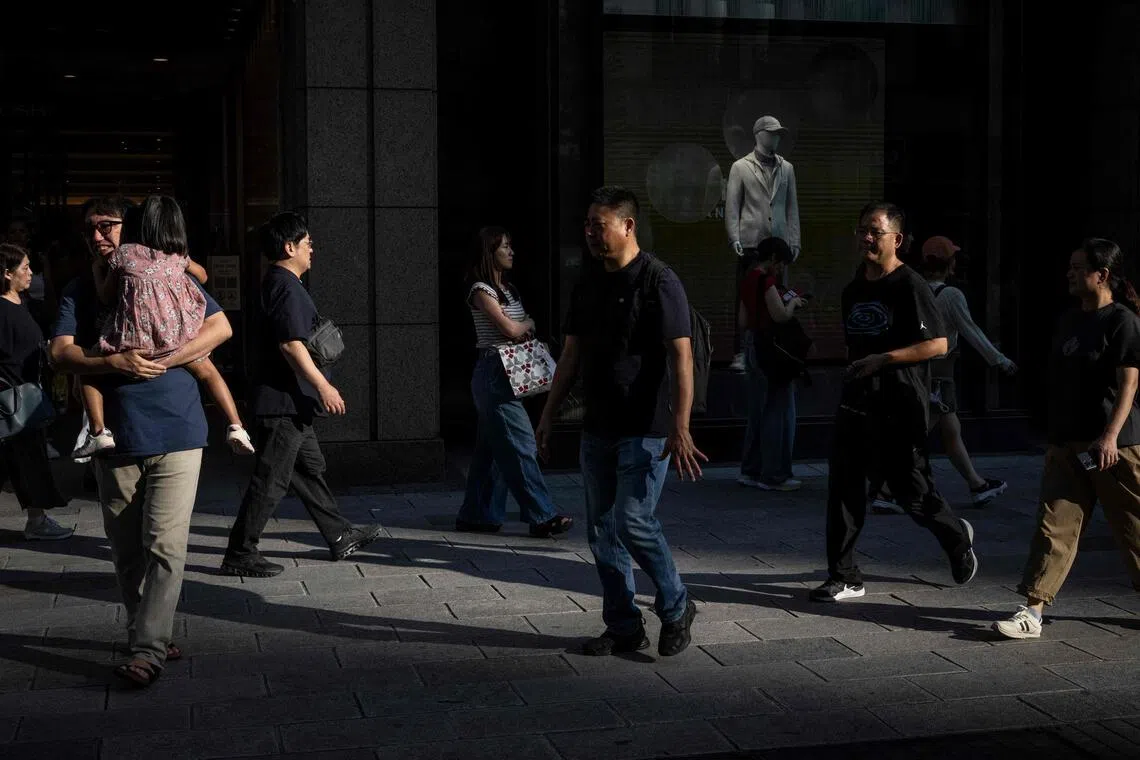Japan’s next PM faces growing anti-immigration fears
Sign up now: Get insights on Asia's fast-moving developments

A Nikkei study showed 97.9 per cent of chief executives want more foreign workers allowed in.
PHOTO: AFP
Warabi, Japan - Turkish kebab restaurant worker Gur Sinan loves and feels welcome in Japan, but anxiety is growing in a country with historically low levels of immigration, just as the ruling party picks a new leader.
“I want to stay here for a long time,” Mr Sinan, 30, told AFP in Warabi, dotted with halal stores and shops with Chinese signs.
“I am studying Japanese. People are very nice here.”
The Liberal Democratic Party (LDP) will elect a new head on Oct 4, who will most likely become the next prime minister after Mr Shigeru Ishiba decided to step down.
The two front runners, arch-nationalist Sanae Takaichi and the youthful Shinjiro Koizumi, are talking tough on foreigners.
Ms Takaichi says Japan should “reconsider policies that allow in people with completely different cultures and backgrounds”.
According to Mr Koizumi: “Illegal employment of foreigners and the worsening of public safety are leading to anxiety among local residents.”
Such alarmism from mainstream politicians is rare in a country that, compared with other rich nations, is safe, and where people born abroad are just 3 per cent of the population.
But life has become harder, with inflation squeezing incomes, and voters have been deserting the LDP, depriving it of a majority in both houses of Parliament.
Fanning the concerns is the “Japanese-first” Sanseito party, which did well in recent elections and calls immigration a “silent invasion”. It blames immigrants and tourists – of which Japan is seeing record numbers – for a host of ills, from rising property prices to bad driving.
Many traditional voters of the LDP – which has governed almost non-stop for decades – are susceptible to such claims, said Emeritus Professor Sadafumi Kawato from the University of Tokyo.
“Coverage of foreigners with bad manners is often picked up by morning and daytime TV programmes, and it appeals to regular people,” he told AFP.
‘Scum’
Japan’s population is ageing and shrinking, and a Nikkei study showed 97.9 per cent of chief executives want more foreign workers allowed in.
In Warabi, where the foreign-born population is 12.4 per cent, Mr Sinan said he has not encountered hostility. Slicing meat off the spit, his colleague Alyoruk Ismail Yasal, 29, agreed, but added: “What’s becoming difficult, in my opinion, is to find a job in Japan.”
Warabi and neighbouring Kawaguchi are home to a sizeable Kurdish community that has become a lightning rod for opponents of immigration, who have staged small demonstrations.
The Japan Kurdish Cultural Association in Kawaguchi has received messages from a “small number of far-right and xenophobic elements”, such as calling Kurds “scum”.
“Japan has structural issues – such as economic stagnation, declining birth rates and an ageing population – that have been ongoing for nearly 30 years, and realistic solutions to these problems have not been found,” the group told AFP. “Instead, the artificial theme of ‘foreigner problems’ is being brought to the forefront, seemingly diverting public attention towards it.”
False claims
The atmosphere can be febrile outside politics, too.
Japan’s international aid agency cancelled a cultural and social exchange programme with four African nations in September.
The programme had triggered floods of e-mails and phone calls from people falsely believing that it was a new immigration policy.
Kitakyushu city was reportedly inundated with complaints after inaccurate claims that it planned Muslim-friendly school lunches.
Japanese residents in Warabi generally get along with the new arrivals, although there is some friction over issues such as separating rubbish. “It’s bad to refuse all foreigners Trump-style. But we can’t welcome all of them with open arms,” retiree Kohei Toyoda, 66, said. AFP


